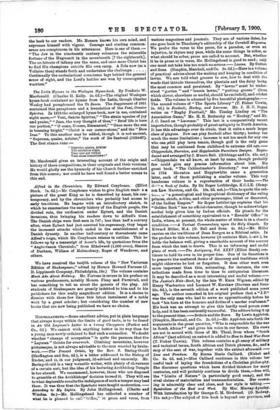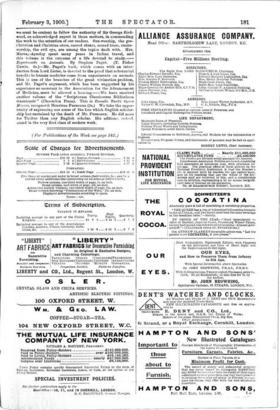MISCELLANE01:18.—Some excellent advice, put in plain language that always keeps
within the limits of good taste, is to be found in An Old Layman's Letter to a I oung Clergyman (Parker and Co., Gd) We cannot wish anything better in its way than for a young man newly ordained to find such a counsellor. We doubt whether " change of occupation " is quite the panacea that the " Layman " thinks for overwork. Climbing mountains, however picturesque, is not always advisable to the man wearied by brain- work.—The Present Crisis, by the Rev. S. Baring-Gould (Skeffington and Son, 4d.), is a letter addressed to the Bishop of Exeter; and is, in our judgment, ill-advised and unseemly. Mr. Baring-Gould is a very versatile writer, with plenty of cleverness of a certain sort, but the idea of his lecturing Archbishop Temple is too absurd. We recommend, however, those who are disposed to grumble at the Archbishops' decision to read it. They will see to what deplorable results the indulgence of such a temper may lead them. It was thus that the Spartans were taught moderation. According to My Lights. By John Hollingshead. (Chatto and Windus. 6s.)—Mr. Hollingshead has collected a number of what he is pleased to Lail " trifles," in prose and verse, from various magazines and journals. They are of various dates, for one goes back to Thackeray's editorship of the Cornhill Magazine. We prefer the verse to the prose, for a paradox, or even an injustice, in rhyme may pass, while the same things in sober, or what should be sober, prose are called to account. But, whether it be in prose or in verse, Mr. Hollingshead is good to read ; only one must not take him too much an serieux.— Lawns. By Sutton and Sons. (Simpkin, Marshall, and Co. 2s. Gd.)—Here is a volume of practical advice about the making and keeping in condition of lawns. We are told what grasses to sow, how to deal with the weeds that intrude themselves, the plantain and the daisy being the most common and persistent. By " lawns" must be under- stood "garden " and "tennis lawns," "putting greens" (from which clover, elsewhere so useful, should be excluded), and cricket fields. The volume is adorned by five beautiful photographs.— The second volume of " The Sports Library" (T. Fisher Unwin, 2s. 6d.) is Football, Hockey, and Lacrosse. Mr. J. H. C. Fegan writes on "Rugby Football," Mr. Tinsley Lindley on "The Association Game," Mr. H. E. Battersby on " Hockey," and Mr. J. C. Isard on " Lacrosse." This last is a comparatively recent importation, though probably of great antiquity in North America. It has this advantage over its rivals, that it suits a much larger class of players. Few can play football after thirty; hockey has much the same limitations ; lacrosse is not too much for any one who can ;still play lawn tennis, though golf is the only game that may be continued from childhood to extreme old age. — Chippendale, Sheraton, and Hepplewhite Furniture Designs. Repro- duced and arranged by J. Munro Bell. (Gibbings and Co. 45s. net.) —Chippendale we all know, at least by name, though probably few could give any precise information about him. His great book, " The Cabinetmaker's Directory," was published in 1754 Sheraton and Hepplewhite came a generation later, each of them publishing a similar volume. This very handsome volume is a reproduction of their books.—The C"'. n Rook of India. By Sir Roper Lethbridge, K.C.I.E. (Samp- son Low Marston, and Co. 10s. Gd. net.)—'Phis, to quote the sub- tes, , ,s " a genealogical and biographical dictionary of the ruling princes, chiefs, nobles, and other personages, titled or decorated, of the Indian Empire." Sir Roper Lethbridge explains that his " Golden Book " has no official character, though he acknowledges cordial help given him by Indian officials. He pleats for the establishment of something equivalent to a " Heralds' Office" in India, where, at present, the whole matter of titles is in a chaotic condition.—A Textual Commentary upon, the Holy Gospels. By Edward Miller, M.A. (G. Bell and Sons. 4s. 3d.)—Mr. Miller carries on the traditions of Dean Burgon as a Biblical critic. In the preface to this volume, however (it contains Matt. i.-xiv.), he holds the balance well, giving a reasonable account of the sources from which the text is drawn. This is an informing and useful piece of work. —The Antiquary, Vol. XXIV (Elliot Stock) con- tinues to hold its own in its proper line. One of its functions is to preserve the scattered items of discovery and traditions which might otherwise be lost or forgotten. It does other work even more important than this, estimating, for instance, the con- tributions made from time to time to antiquarian literature. It may be described as a most interesting and useful volume.— The Justice's Note -Book, by the late W. Knox Wigram, edited by Henry Warburton and Leonard W. Kershaw (Stevens and Sons, 10s. 6d.), is the seventh edition of a work published some years ago. The author remarked in his original preface that a "J.P." was the only man who had to serve no apprenticeship before he took "his turn at the honours and duties of a master craftsman." His book was an attempt to give this hardly used person some help, and it has been eminently successful. The editors bring it up to the present time.—Britain and the Boers. By Lewis Appleton. (Simpkin, Marshall, and Co. 2s. 6d.)—Mr. Appleton sets forth the arguments in the great question, " Who is responsible for the war in South Africa ? " and gives his voice in our favour. His views are not in accord with those of Mr. Theal, from whose "South Africa" (last edition) an extract is added to How to Read War News (T. Fisher Unwin). This volume contains a gl.ssary of military and technical terms, South African and Dutch phrases, &c., and a map of the seat of war, together with the extract aforesaid — Law and Freedom. By Emma Marie Caillard. (Nisbet and Co. 3s. Gd. net.)—Miss Caillard continues in this volume her useful task of laying the foundations of a Christian philossphy. She discusses questions which have divided thinkers for many centuries, and will probably continue to divide them,—free will, the Limits of Nature " (a particularly good essay), and the rival claims of materialism and transcendentalism. Her reason- ing is admirably clear and close, and her style is telling.
Symbolism of the East and west. By Mrs. Murray-Aynsley- With Introduction by Sir George C. M. Birdwood. (G. Redway. 21s. net.)—The subject of this book is beyond our province, and we must be content to follow the authority of Sir George Bird- wood, an acknowledged expert in these matters, in commending the work to the attention of our readers. Sun-worship, the pre- Christian and Christian cross, sacred stones, sacred trees, snake- worship, the evil eye, are among the topics dealt with. Mrs. Murray -Ayneley spent many years in Indian travel, and this volume is the outcome of a life devoted to study.— Experiments on Animals. By Stephen Paget. (T. Fisher Unwin. Os.)—Mr. Paget's book, which comes with an intro- duction from Lord Lister, is devoted to the proof that substantial benefits to human medicine come from experiments on animals This is one of the branches of the great vivisection problem, and Ur. Paget's argument, which has been suggested by his experience as secretary to the Association for the Advancement of Medicine, must be allowed a hearing.—We have received another volume of the " Scriptornm Classicorum Bibliotheca Oxonien.sis " (Clarendon Press). This is Cornelii Taciti Opera Minora, recognovit Henricus Fnrneaux (28.) We take the oppor- tunity of expressing our sense of the loss which English scholar- ship has sustained by the death of Mr. Furneanx. He did more for Tacitus than any English scholar. His editions, indeed. stand in the very first class of modern work.







































 Previous page
Previous page